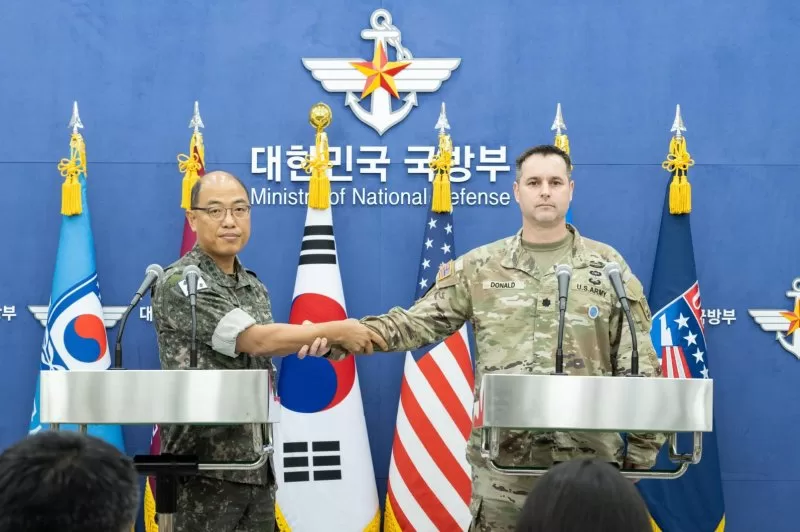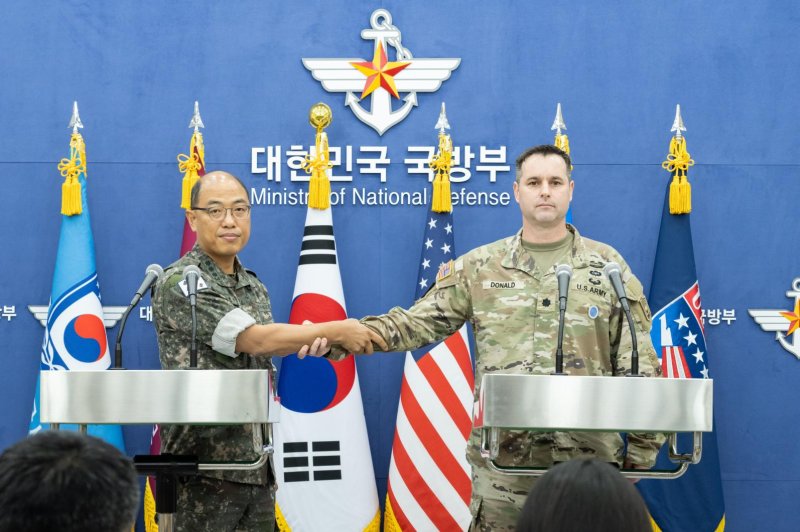Col. Lee Sung-jun (L), spokesman for South Korea’s Joint Chiefs of Staff, and Col. Ryan Donald (R), spokesman for U.S Forces Korea, announce the upcoming Ulchi Freedom Shield joint military exercise at a press briefing in Seoul Monday. Photo courtesy of Republic of Korea Joint Chiefs of Staff
SEOUL, Aug. 12 (UPI) — The United States and South Korea will kick off a large-scale joint military exercise next week, both countries announced Monday, with a focus on deterring North Korea‘s growing nuclear, missile and cyber threats.
The annual Ulchi Freedom Shield exercise will be held from Aug. 19-29 and will include live field maneuvers, computer simulation-based command post exercises and related civil defense drills.
The drills will “reflect realistic threats across all domains such as Democratic People’s Republic of Korea’s increasing missile threats, GPS jamming, cyber-attacks, and lessons learned from recent armed conflict,” both militaries said in a joint press release.
The Democratic People’s Republic of Korea is the official name of North Korea.
“In particular, the ROK-U.S. Alliance will further strengthen its capability and posture to deter and defend against weapons of mass destruction,” the release said, using the official acronym for South Korea.
Some 19,000 South Korean troops will participate in the drills, Col. Lee Sung-jun, spokesman for South Korea’s Joint Chiefs of Staff, said at a press briefing in Seoul on Monday.
There will be a total of 48 field-training exercises including amphibious landing and live-fire drills — up from 30 in last year’s Ulchi Freedom Shield.
“We are going to focus on deterring the use of weapons of mass destruction, including North Korea’s nuclear missiles,” Lee said.
A North Korean nuclear use scenario will be held during the government-led Ulchi civil defense and evacuation drills on Aug. 19-22, he added.
“[Ulchi Freedom Shield] exercise will reflect realistic threats across all domains, such as the DPRK missile threats,” Col. Ryan Donald, spokesperson for U.S Forces Korea, said.
“This is all designed so we don’t have a failure of imagination, so we can ensure we defend the Republic of Korea,” Donald said.
Pyongyang frequently condemns the allies’ joint drills as preparation for an invasion and maintains that its nuclear and missile programs are a necessary form of deterrence.
The exercise comes amid a steady stream of weapons tests and heated rhetoric from the North. Last week, Kim Jong Un announced that Pyongyang would deploy 250 new nuclear-capable missile launchers to frontline positions along the border with the South.
Since early June, North Korea has also sent thousands of balloons carrying scrap paper, manure and discarded clothes into the South in a type of Cold War-era psychological warfare. Trash from at least one balloon landed on the compound of South Korean President Yoon Suk Yeol last month, alarming officials.
The North launched some 240 balloons Saturday, the JCS said in a text message to reporters, with only around 10 landing in the South.
Washington and Seoul have ramped up their military cooperation in response to the North’s provocations, with expanded drills and the rotation of U.S. bombers, submarines and aircraft carriers to the Peninsula. Last month, the allies signed new nuclear deterrence guidelines that formalize the deployment of U.S. nuclear assets in response to North Korean threats.
In addition to U.S. and South Korean forces, personnel from other member countries of the United Nations Command will join the Ulchi Freedom Shield exercise.
The U.S.-led UNC plays a key role in maintaining and enforcing the armistice agreement that halted fighting in the 1950-53 Korean War, with duties that include controlling DMZ access and communicating with the North Korean military.
Earlier this month, Germany became the 18th member state to formally join the UNC.

